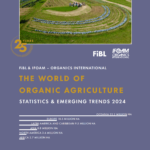
35 downloads
Title of document: The World of Organic Agriculture Statistics & Emerging Trends 2024 Authors/editor: Helga Willer, Jan Trávníček and Bernhard Schlatter Journal’s name if any: Ministry/Government Agency/Organization: FiBL & IFOAM – ORGANICS INTERNATIONAL Year of publication: 2024 Geographic focus: Global level Main issues/ topics addressed (for example: Organic Agriculture Worldwide: Current Statistics; Global Market For Organic Food And Drink; Standards And Regulations Policy Support…) School of agroecology (if any): Web address to original document (if any): https://www.fibl.org/en/shop-en/1747-organic-world-2024 Summary: Organic agriculture is practised in 188 countries, and more than 96 million hectares of agricultural land are managed organically by at least 4.5 million farmers. Global sales of organic food and drink reached almost 135 billion euros in 2022. The 25th edition of "The World of Organic Agriculture", published by the Research Institute of Organic Agriculture FiBL and IFOAM – Organics International, offers a comprehensive review of recent developments in global organic agriculture. It presents detailed statistics on organic farming that relate to area under organic management, land use and crops, the number of farms and other operator types, retail sales and international trade data. The book includes contributions from representatives of the organic sector from around the world about the global market for organic food, organic imports, regulations and policies. It offers insights into current and emerging trends in organic agriculture in Africa, Asia, Europe, Latin America, North America, and Oceania and reports on several countries. Read More
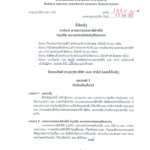
12 downloads
Title of document: Agreement of the Minister on Good Agriculture Practices for Agriculture Products Standard in Lao PDR [Lao Version] Authors/editor: DOA Journal’s name if any: Ministry/Government Agency/Organization: MAF Year of publication: 2022 Geographic focus: Lao PDR Main issues/ topics addressed (for example: New Agreement of the Minister on Good Agriculture Practices for Agriculture Products Standard in Lao PDR) School of agroecology (if any): Web address to original document (if any): Summary: New agreement of the Ministry of Agriculture and Forestry on Good Agriculture Practices for Agriculture Products Standard in Lao PDR, No. 3004/MAF, date 15 June 2022. Read More
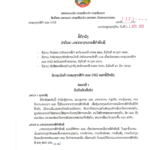
12 downloads
Title of document: Agreement of the Minister on Organic Agriculture Standards in Lao PDR [Lao Version] Authors/editor: DOA Journal’s name if any: Ministry/Government Agency/Organization: MAF Year of publication: 2022 Geographic focus: Lao PDR Main issues/ topics addressed (for example: new agreement of the Minister on Organic Agriculture Standards) School of agroecology (if any): Web address to original document (if any): Summary: New agreement of the Ministry of Agriculture and Forestry on Organic Agriculture Standards, No. 1393/MAF, date 11 April 2022. Read More
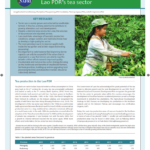
8 downloads
Title of document: NAFRI Policy Brief - Unlocking the full potential of Lao PDR’s tea sector_English & Lao version Authors/editor: Sengphachanh Sonethavixay, Khamphou Phouyyavong (PhD Candidate), Phanxay Ingxay (PhD), Isabelle Vagneron (PhD) Journal’s name if any: Ministry/Government Agency/Organization: NAFRI Year of publication: 2018 Geographic focus: Lao PDR Main issues/ topics addressed (for example:…) School of agroecology (if any): Web address to original document (if any): Summary: Policy Brief No. 001/2018: Tea in Laos is mainly grown and collected by smallholder farmers. It thus has a strong potential to contribute to poverty alleviation and rural development. Despite a relatively large production area, the volumes of tea produced and exported are low. Laos could take advantage of favorable production conditions, unique varieties and traditional know-how to develop a high-quality tea sector. The most pressing issue is to improve quality both inside the tea garden and at later stages (harvesting, processing). It is important to note however that improving farmer capacity can only be successful if the value-chain is organized in a way that farmers are able to reap the benefi ts of their eff orts towards improved quality. A sustainable and inclusive tea sector strategy focusing on the livelihoods and benefi ts of smallholder farmers, fair trade practices, building up and/or upgrading local processing facilities and diversifi ed markets should be collectively defi ned. Read More
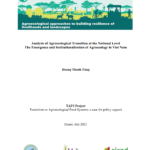
59 downloads
Title of document: Analysis of agroecological transition at the national level the emergence and institutionalization of agroecology in Viet Nam Authors/editor: Hoang Thanh Tung Journal’s name if any: Ministry/Government Agency/Organization: TAFS Project Year of publication: 2021 Geographic focus: Vietnam Main issues/ topics addressed (for example: The Agroecological Transition Policies in Viet Nam; Solutions to facilitate sustainable agroecology transition in Viet Nam…) School of agroecology (if any): Web address to original document (if any): Summary: The main objective of this study is to document what agroecology means in Vietnam and its degree of institutionalization in the existing policy framework. The study analyses the processes related to the emergence of agroecology in Vietnam, and the role played by different stakeholders in the public debate, which refers to the first step of the TAFS project (see figure p. 2). The review focuses on the last 10-15 years, when agroecology has emerged internationally in the policy debate within the preparation of the Sustainable Development Goals (SDGs). This investigation will make possible to draw out the issues (challenges, themes, methods) surrounding the conceptualization and implementation of agroecological policies in the country. Read More
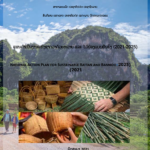
72 downloads
Title of document: National Action Plan for Sustainable Rattan and Bamboo (2020-2025) Authors/editor: GRET, MAF, WWF, SDC Journal’s name if any: Ministry/Government Agency/Organization: GRET, MAF, WWF, SDC Year of publication: 2021 Geographic focus: Lao PDR Main issues/ topics addressed (for example: …) School of agroecology (if any): Web address to original document (if any): Summary: Lao PDR is endowed with biodiversity and rattan and bamboo species that have played an important role in generating income for the rural communities. It was estimated that rattan and bamboo can contribute about 22,000,000 US dollars or more per year to the country's Gross Domestic Product (GDP) with about 150,000 households, within 1,700 villages, have access to and use rattan-bamboo resources. Many stakeholders agreed that the rattan-bamboo sectors still have a high potential for sustainable development based on the experiences and lessons learned from many projects that have been implemented in the past, such as the Bamboo and Rattan Project (GRET) and the Sustainable Rattan and Bamboo Harvesting Project (WWF). In Lao PDR, the sector’s development is still very scattered without a specific action plan to support it. This has resulted in the limited effectiveness of resource management for rattan and bamboo. The development of rattan and bamboo value chains and their contribution to income generation and poverty reduction can be improved. Read More
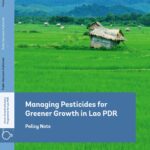
22 downloads
Title of document: Managing Pesticides for Greener Growth in Lao PDR (Ver. English & Laotian) Authors/editor: World Bank Journal’s name if any: Ministry/Government Agency/Organization: World bank Year of publication: 2021 Geographic focus: Lao PDR Main issues/ topics addressed (for example:…) School of agroecology (if any): Web address to original document (if any): Summary: Pesticides management is important for sustainable agriculture and green growth. Sound pesticides management and Integrated Pest Management (IPM) in particular are widely acknowledged as important mechanisms to mitigate pre- and post-harvest losses and to achieve sustainable agricultural intensification. Read More
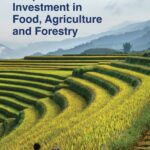
58 downloads
Title of document: ASEAN Guidelines for Responsible Investment in Food, Agriculture and Forestry Authors/editor: ASEAN Secretariat Journal’s name if any: Ministry/Government Agency/Organization: ASEAN Secretariat, Grow Asia, the International Institute for Sustainable Development (IISD), the Swiss Agency for Development and Cooperation (SDC) and a World Bank trust fund. Year of publication: 2019 Geographic focus: ASEAN Main issues/ topics addressed (for example:…) School of agroecology (if any): Web address to original document (if any): Summary: The ASEAN Guidelines on Promoting Responsible Investment in Food, Agriculture and Forestry were adopted by ASEAN Ministers on Agriculture and Forestry (AMAF) in October 2018 and were developed in response to a decision by that same group the year prior. The guidelines have as their main objective the promotion of responsible regional investment in food, agriculture and forestry that ensures economic development, while also incorporating and reflecting the diverse circumstances of different ASEAN member states. Ensuring responsible investment in these sectors will be key in meeting the food safety and security needs of the growing population of the Southeast Asian region. The guidelines are grounded in the Committee on World Security’s Principles for Responsible Agriculture and Food Systems (CFS-RAI). They were developed through a multi-stakeholder process involving the ASEAN Secretariat, Grow Asia, the International Institute for Sustainable Development, the Swiss Agency for Development Cooperation and a World Bank trust fund. Read More
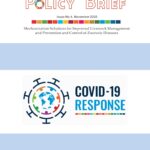
5 downloads
Title of document: Policy Brief - Issue No. 4: Mechanization Solutions for Improved Livestock Management and Prevention and Control of Zoonotic Diseases Authors/editor: UN-ESCAP CSAM Journal’s name if any: Ministry/Government Agency/Organization: UN-ESCAP CSAM Year of publication: 2020 Geographic focus: Asia Main issues/ topics addressed (for example: Role of Mechanization in Prevention and Control of Zoonotic Diseases; Recommendations…) School of agroecology (if any): Web address to original document (if any): http://www.un-csam.org/Publication/PB-2020-03-ENG.pdf Summary: Read More
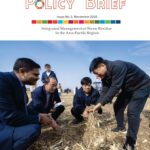
6 downloads
Title of document: Policy Brief - Issue No. 3: Integrated Management of Straw Residue in the Asia-Pacific Region Authors/editor: UN-ESCAP CSAM Journal’s name if any: Ministry/Government Agency/Organization: UN-ESCAP CSAM Year of publication: 2020 Geographic focus: Asia Main issues/ topics addressed (for example: Impact of the Pandemic on Agriculture in the Asia-Pacific Region; Role of sustainable agricultural mechanization in supporting recovery and building resilience…) School of agroecology (if any): Web address to original document (if any): http://www.un-csam.org/Publication/PB-2020-03.pdf Summary: Burning of straw residue is a common practice in many countries of the Asia-Pacific region. In recent times, this practice has drawn the attention of policymakers and the public due to its adverse effects on the environment, including air pollution which impacts the life of millions of people across countries and contributes to climate change as well as loss of fertility of agricultural land. Appropriate agricultural machinery can help farmers adopt sustainable and integrated management of straw residue including its use as fertilizer, cattle feed, bioenergy, substrate for growing mushrooms and industry material. Read More

 Asia & Mekong Region
Asia & Mekong Region  Cambodia
Cambodia  Laos
Laos  Myanmar
Myanmar  Other
Other  Vietnam
Vietnam